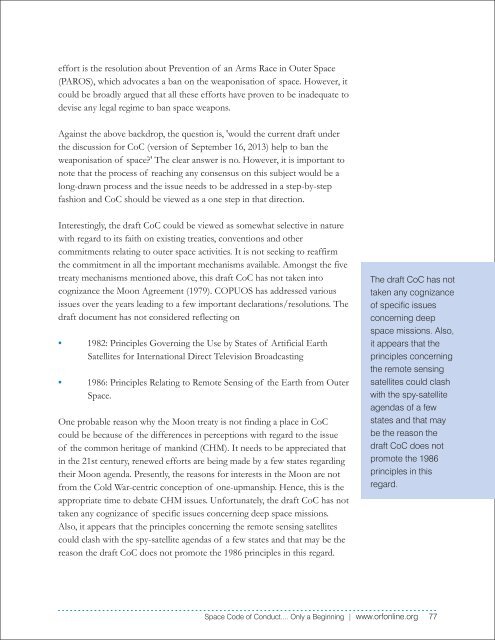AwaitingLaunch_1397728623369
AwaitingLaunch_1397728623369
AwaitingLaunch_1397728623369
You also want an ePaper? Increase the reach of your titles
YUMPU automatically turns print PDFs into web optimized ePapers that Google loves.
effort is the resolution about Prevention of an Arms Race in Outer Space<br />
(PAROS), which advocates a ban on the weaponisation of space. However, it<br />
could be broadly argued that all these efforts have proven to be inadequate to<br />
devise any legal regime to ban space weapons.<br />
Against the above backdrop, the question is, 'would the current draft under<br />
the discussion for CoC (version of September 16, 2013) help to ban the<br />
weaponisation of space?' The clear answer is no. However, it is important to<br />
note that the process of reaching any consensus on this subject would be a<br />
long-drawn process and the issue needs to be addressed in a step-by-step<br />
fashion and CoC should be viewed as a one step in that direction.<br />
Interestingly, the draft CoC could be viewed as somewhat selective in nature<br />
with regard to its faith on existing treaties, conventions and other<br />
commitments relating to outer space activities. It is not seeking to reaffirm<br />
the commitment in all the important mechanisms available. Amongst the five<br />
treaty mechanisms mentioned above, this draft CoC has not taken into<br />
cognizance the Moon Agreement (1979). COPUOS has addressed various<br />
issues over the years leading to a few important declarations/resolutions. The<br />
draft document has not considered reflecting on<br />
•<br />
•<br />
1982: Principles Governing the Use by States of Artificial Earth<br />
Satellites for International Direct Television Broadcasting<br />
1986: Principles Relating to Remote Sensing of the Earth from Outer<br />
Space.<br />
One probable reason why the Moon treaty is not finding a place in CoC<br />
could be because of the differences in perceptions with regard to the issue<br />
of the common heritage of mankind (CHM). It needs to be appreciated that<br />
in the 21st century, renewed efforts are being made by a few states regarding<br />
their Moon agenda. Presently, the reasons for interests in the Moon are not<br />
from the Cold War-centric conception of one-upmanship. Hence, this is the<br />
appropriate time to debate CHM issues. Unfortunately, the draft CoC has not<br />
taken any cognizance of specific issues concerning deep space missions.<br />
Also, it appears that the principles concerning the remote sensing satellites<br />
could clash with the spy-satellite agendas of a few states and that may be the<br />
reason the draft CoC does not promote the 1986 principles in this regard.<br />
The draft CoC has not<br />
taken any cognizance<br />
of specific issues<br />
concerning deep<br />
space missions. Also,<br />
it appears that the<br />
principles concerning<br />
the remote sensing<br />
satellites could clash<br />
with the spy-satellite<br />
agendas of a few<br />
states and that may<br />
be the reason the<br />
draft CoC does not<br />
promote the 1986<br />
principles in this<br />
regard.<br />
Space Code of Conduct.... Only a Beginning | www.orfonline.org 77








